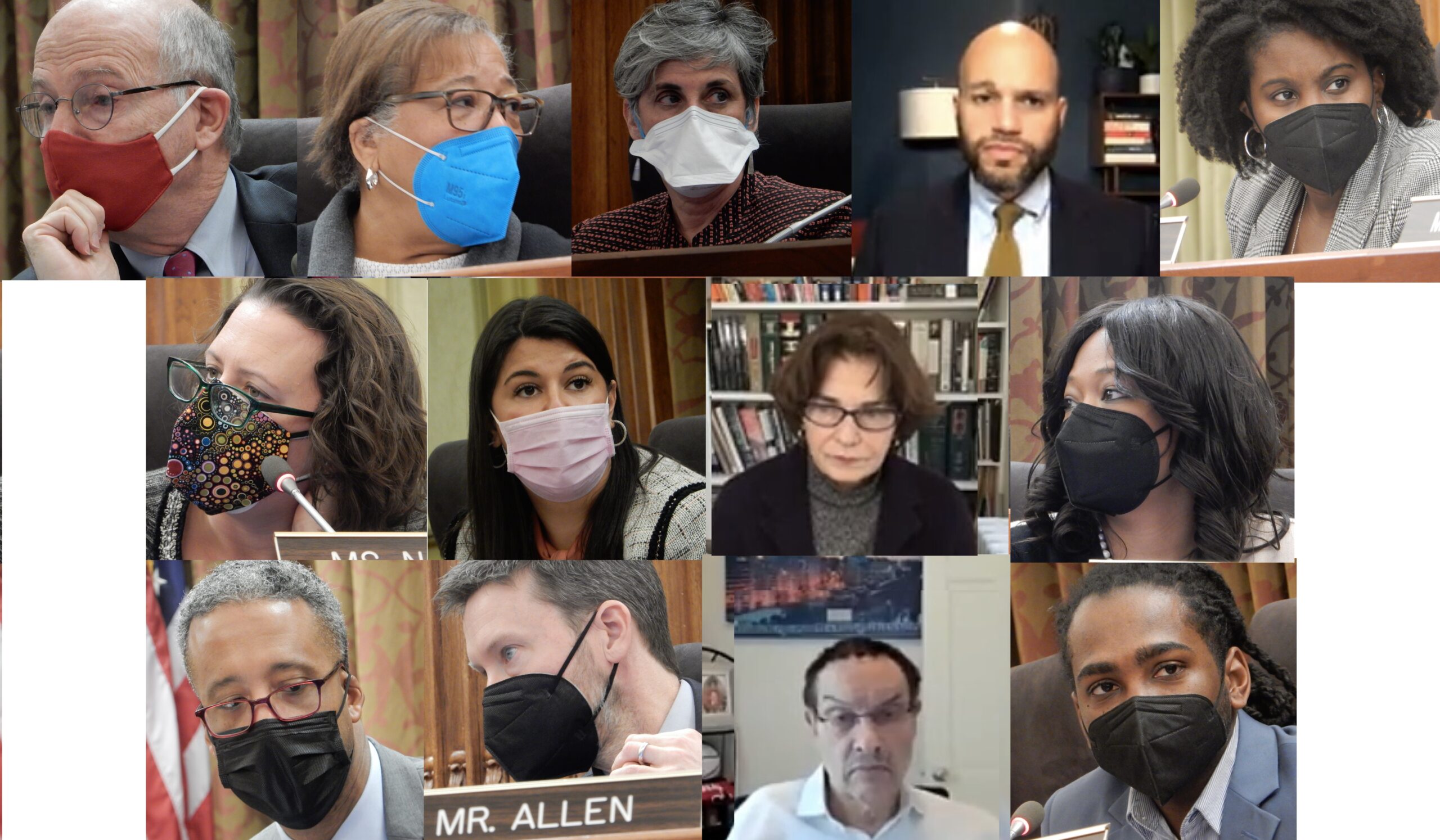Council Returns to In-Person Meetings, Passes Short List of Priority Policy Needs for Inclusion in Mayor’s Supplemental Budget

Before COVID, the Council only had one kind of Legislative Meetings—in person, either in the Council Chamber at the John A. Wilson Building, or, while that building was under renovation in the late 1990s/early 2000s, at 441 4th Street (now the Marion S. Barry Building).
On March 3, 2020, the Council held its final pre-COVID Legislative Meeting in the Chamber. It was at the following Legislative Meeting, held on March 17, 2020, that the Council passed the first of several major bills to respond to the COVID crisis. That final in-person meeting at the Wilson Building, however, was held in Room 412, which allowed for more social distancing among councilmembers.
(Since masking was not yet recommended by public health authorities, and supplies of personal protective equipment were reserved for medical workers, councilmembers at that meeting were not masked. That Legislative Meeting was also unusual in that the councilmembers heard from then-Chief Financial Officer Jeff DeWitt on the potential impact of the virus. It is very unusual for councilmembers to hear from witnesses during a Legislative Meeting.)
As COVID quickly spread, the Council pivoted to a second kind of Legislative Meeting: fully virtual and online, on the Zoom platform. Our meetings for most of 2020, all of 2021, and the beginning of 2022 were all held virtually.
Now, with COVID numbers at least temporarily on the decline, the Council has introduced a third, and hopefully temporary, configuration for its Legislative Meetings—a hybrid format, with members attending both in person and online. For our most recent Legislative Meeting, the Council returned to the Chamber for the first time in nearly two years. Ten members attended in person, and three attended virtually via Zoom, with their images projected on a screen over the dais.
While hopefully these hybrid Legislative Meetings are just temporary artifacts of the phase of the COVID pandemic we are enduring currently, the Council hopes to maintain the capacity to hold hybrid meetings for its day-to-day committee hearings on an ongoing basis. During all the months that the Council held online hearings, we found that many people who might not have otherwise had the ability or interest to spend a whole day downtown waiting to testify in person to a Council committee could and did find five minutes to appear virtually at an online hearing. Some students testified from school hallways, families of crime victims testified from crime scenes, and once, a witness in the midst of business travel testified from the comparative quiet of an airport restroom stall. By continuing to provide hybrid meetings moving forward, the Council applauds this expansion of participatory democracy, and recognizes that for many residents, testifying virtually is a feature and not a bug.
At the Council’s most recent Legislative Meeting, one primary bill was passed unanimously. Given that a December quarterly revenue estimate increased expected revenues by $357 million, and the recently submitted Annual Comprehensive Financial Report included a surplus of $566 million, the District is facing potential unexpected spending availability. Many years back, the Council would formally file a legislative request for the Mayor to submit a supplemental budget when needed. But in its most recent action, the Council went one step further—not just re-instituting this practice of requesting a supplemental budget be sent over, but also expressing a unanimous Sense of the Council regarding how those dollars would best be spent.
In the legislation, the Council outlined these priorities:
- Providing emergency rent and utility assistance, to fill the gap left by the sunsetting of the COVID-inspired STAY DC program
- Funding increased student/staff COVID safety and mental health services in schools
- Fighting the recent increase in crime through violence prevention and improved public safety
- Expanding out-of-school time diversionary activities for youth, including employment and recreation
- Increasing personal pandemic leave for DC government employees
In addition to these recommended funding increases, the Council emphasized the importance of better targeting certain already-funded but under-implemented priorities. These include programs that provide mental health services in schools, permanent supportive housing, violence prevention, and employment opportunities.
The Council’s next regularly scheduled Legislative Meeting, which will also be a hybrid meeting, will be held on March 1.